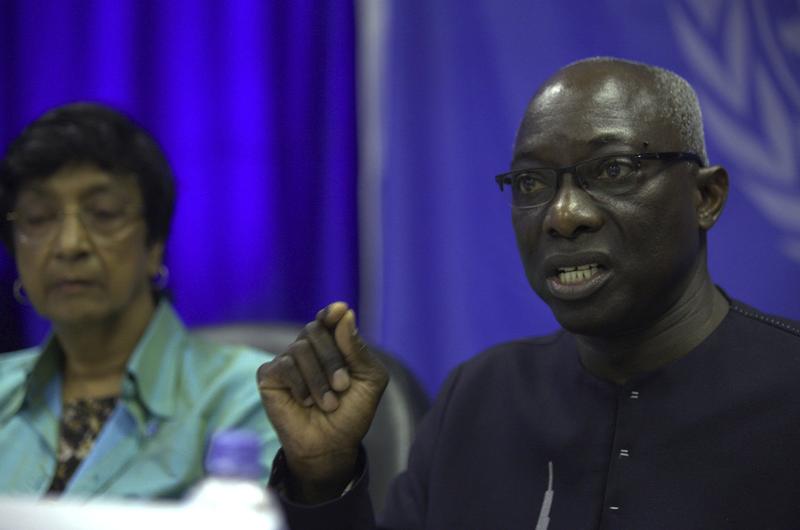Calls for an independent commission to investigate alleged human rights abuses in Arakan State were further raised on Monday by the United Nations special adviser on the prevention of genocide, who said the current government-appointed body was not up to the task.
“The existing commission is not a credible option to undertake the new investigation,” stated Adama Dieng, the UN special adviser.
The pressure and public outcry has grown in recent days in response to a damning report from the office of the UN High Commissioner for Human Rights (OHCHR) that documented serious atrocities committed by Burmese security forces against Rohingya since a series of attacks on border police posts on 9 October prompted a security crackdown.
In joint military and police “area clearance operations” that followed, tens of thousands of Rohingya Muslims from northern Arakan State have fled to Bangladesh. The OHCHR report was based on the testimonies of more than 200 of these refugees, many of whom said they had been victims of, or witnessed, members of the security forces gang-raping, summarily executing and torching Rohingya homes and shops.
Dieng urged a “truly independent and impartial body” with international observers to investigate the evidence of abuses against the Rohingya. He continued, “I am concerned that the government commission, which had unhindered access to the location of the incidents, found nothing to substantiate the claims, while OHCHR, which was not given access to the area, found an overwhelming number of testimonies and other forms of evidence through interviews with refugees who had fled to a neighbouring country.”
When asked if the existing Arakan State Investigation Commission would conduct its probe differently in light of the OHCHR report, a spokesperson for the State Counsellor’s Office, Zaw Htay, replied in a text message to DVB, “The U Myint Swe commission will investigate immediately. In the current situation they are considering to do their job the best.”
Zaw Htay added that he “didn’t know yet” if the commission, which is chaired by Vice President Myint Swe, would work with independent researchers.
The commission led by Myint Swe, a retired lieutenant general, was granted an indefinite extension to its reporting deadline at the start of the month.
Human Rights Watch’s Asia division deputy director Phil Robertson agreed that the composition of the commission needs to be revised.
“From its chair on down, it’s problematic because it’s full of military and government insiders who have no real incentive to become truth tellers to a government that so far has been denying facts and holding its hands firmly over its ears.”
HRW also released a report on Monday documenting 28 incidents of rape and other sexual assault.
The government-appointed commission has so far made only two field visits to northern Arakan State. In an interim report released in early January, claims of rape, torture and extrajudicial killings allegedly committed by security forces against the Rohingya population were dismissed, with the 11-member commission citing a lack of substantive evidence supporting the allegations.
Human rights groups panned the report; Robertson at the time described its findings as a “whitewash.”
The methodology of the commission was further questioned by Yanghee Lee, the UN special rapporteur on human rights in Burma, during her recent visit to the country, with the envoy offering UN assistance to the Myint Swe commission to bolster its credibility.
Robertson raised those concerns about the credibility of the commission’s report with DVB on Monday and again recommended that the government lend its support to independent researchers to report what they find without fear or favor.
“There should be no repeat of the interim report, which was pretty universally condemned as being one-sided and inadequate.”
Zeid Ra’ad al-Hussein, the UN high commissioner for human rights, spoke to State Counsellor Aung San Suu Kyi after his office’s report was published and said she supported the launch of an investigation into its findings. Previously, the Suu Kyi government had consistently sought to discredit mounting allegations of grave human rights abuses in Arakan State.
[related]
So far there has been no official denial of the bleak testimonies in the OHCHR report. They ranged from a 14-year-old girl who saw her mother beaten to death and her two sisters killed in a knife attack after she was raped by soldiers, to another testimony from an 18-year-old girl who saw her mother caught by the military when she tried to flee and had her throat slit with a long knife usually used to slaughter animals. Over half of the women interviewed reported having been raped or otherwise sexually abused, and many witnesses reported that family members had been killed or “disappeared.”
Champa Patel, interim director of Amnesty International’s Southeast Asia and Pacific regional office, said it is becoming more difficult for the government to continue to deny that human rights violations against the Rohingya have taken place.
“The government must now invite the UN to assist them in carrying out an investigation which meets international standards of independence and impartiality. Only such credible investigation will help establish the truth and prevent further abuses from occurring,” said Patel.
Access to the northern Arakan region is still restricted for journalists, and independent researchers have not been permitted inside the area undergoing the “clearance operations.” The OHCHR sought permission to conduct research for its report in northern Arakan State, but was denied.



